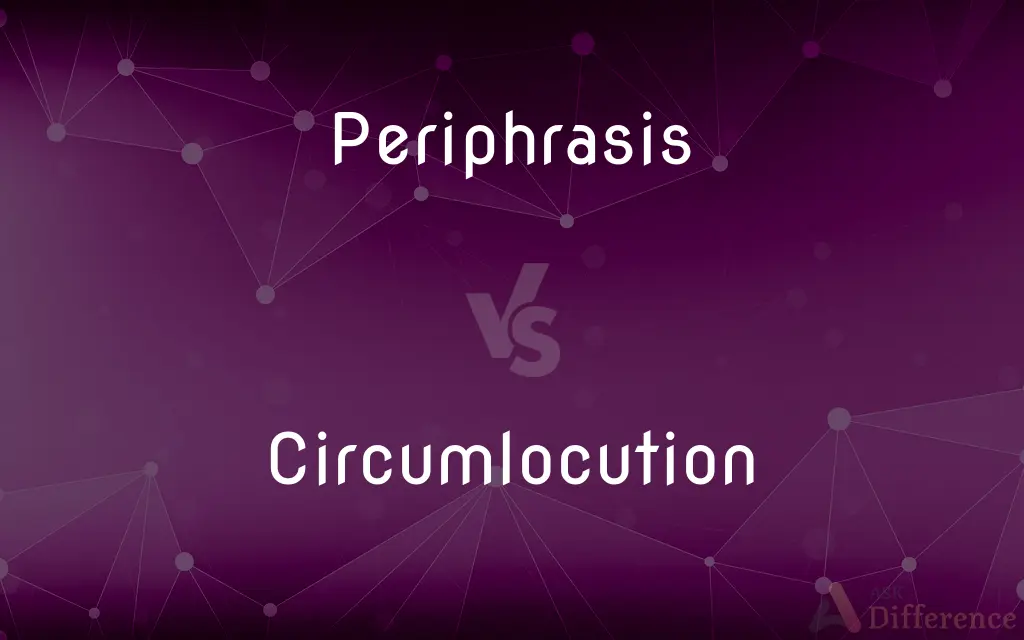Periphrasis vs. Circumlocution — What's the Difference?

Difference Between Periphrasis and Circumlocution
ADVERTISEMENT
Compare with Definitions
Periphrasis
In linguistics, periphrasis () is the usage of multiple separate words to carry the meaning of prefixes, suffixes or verbs, among other things, where either would be possible. It is a device where grammatical meaning is expressed by one or more free morphemes (typically one or more function words accompanying a content word), instead of by inflectional affixes or derivation.
Circumlocution
Circumlocution (also called circumduction, circumvolution, periphrasis, kenning or ambage) is a phrase that circles around a specific idea with multiple words rather than directly evoking it with fewer and apter words. It is sometimes necessary in communication (for example, to avoid lexical gaps that would cause untranslatability), but it can also be undesirable (when an uncommon or easily misunderstood figure of speech is used).
Periphrasis
The use of circumlocution.
Circumlocution
The use of unnecessarily wordy language, especially in being vague or evasive.
Periphrasis
A circumlocution.
ADVERTISEMENT
Circumlocution
A roundabout or evasive expression
Circumlocutions like "go to the bathroom" are often used in place of words that are considered vulgar or indelicate.
Periphrasis
The use of a longer expression instead of a shorter one with a similar meaning, for example "I am going to" instead of "I will".
Circumlocution
(uncountable) A roundabout or indirect way of speaking; thus:
Periphrasis
(linguistics) Expressing a grammatical meaning (such as a tense) using a syntactic construction rather than morphological marking.
Language learners sometimes use periphrases like "did go" where a native speaker would use "went".
Native speakers use periphrases like "did not go" where a language learner might use "went not".
Circumlocution
(uncountable) Unnecessary use of extra words to express an idea, such as a pleonastic phrase (sometimes driven by an attempt at emphatic clarity) or a wordy substitution (the latter driven by euphemistic intent, pedagogic intent, or sometimes loquaciousness alone).
Periphrasis
(rhetoric) The substitution of a descriptive word or phrase for a proper name (a type of circumlocution).
Circumlocution
(uncountable) Necessary use of a phrase to circumvent either a vocabulary fault (of speaker or listener) or a lexical gap, either monolingually or in translation.
A technical word, such as hyperkalemia or hypoallergenic, can be glossed for general audiences with a circumlocution, such as "high potassium level" or "less likely to cause allergies" (respectively).
Periphrasis
(rhetoric) The use of a proper name as a shorthand to stand for qualities associated with it.
Circumlocution
(countable) An instance of such usage; a roundabout expression, whether an inadvisable one or a necessary one.
Periphrasis
See Periphrase.
Circumlocution
The use of many words to express an idea that might be expressed by few; indirect or roundabout language; a periphrase.
The plain Billingsgate way of calling names . . . would save abundance of time lost by circumlocution.
Periphrasis
A style that involves indirect ways of expressing things
Circumlocution
A style that involves indirect ways of expressing things
Circumlocution
An indirect way of expressing something
Share Your Discovery

Previous Comparison
Defraud vs. Fraud
Next Comparison
Emergency vs. Disaster













































